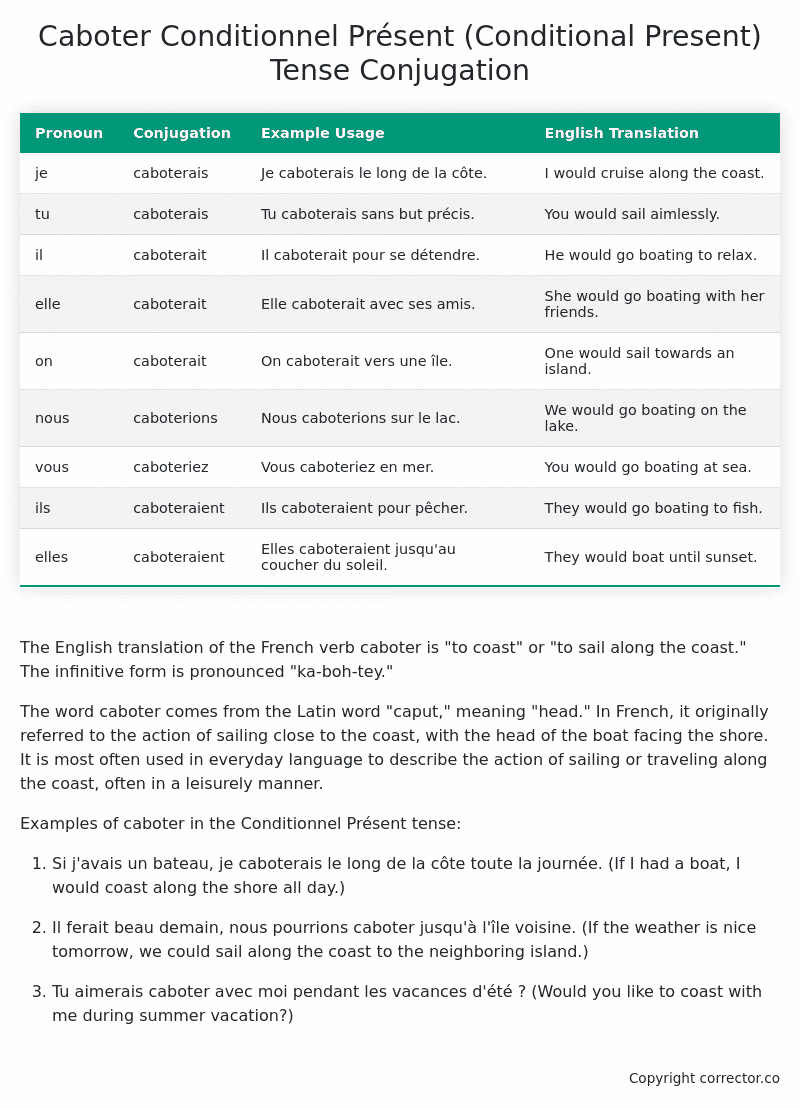Conditionnel Présent (Conditional Present) Tense Conjugation of the French Verb caboter
Introduction to the verb caboter
The English translation of the French verb caboter is “to coast” or “to sail along the coast.” The infinitive form is pronounced “ka-boh-tey.”
The word caboter comes from the Latin word “caput,” meaning “head.” In French, it originally referred to the action of sailing close to the coast, with the head of the boat facing the shore. It is most often used in everyday language to describe the action of sailing or traveling along the coast, often in a leisurely manner.
Examples of caboter in the Conditionnel Présent tense:
-
Si j’avais un bateau, je caboterais le long de la côte toute la journée. (If I had a boat, I would coast along the shore all day.)
-
Il ferait beau demain, nous pourrions caboter jusqu’à l’île voisine. (If the weather is nice tomorrow, we could sail along the coast to the neighboring island.)
-
Tu aimerais caboter avec moi pendant les vacances d’été ? (Would you like to coast with me during summer vacation?)
Table of the Conditionnel Présent (Conditional Present) Tense Conjugation of caboter
| Pronoun | Conjugation | Example Usage | English Translation |
|---|---|---|---|
| je | caboterais | Je caboterais le long de la côte. | I would cruise along the coast. |
| tu | caboterais | Tu caboterais sans but précis. | You would sail aimlessly. |
| il | caboterait | Il caboterait pour se détendre. | He would go boating to relax. |
| elle | caboterait | Elle caboterait avec ses amis. | She would go boating with her friends. |
| on | caboterait | On caboterait vers une île. | One would sail towards an island. |
| nous | caboterions | Nous caboterions sur le lac. | We would go boating on the lake. |
| vous | caboteriez | Vous caboteriez en mer. | You would go boating at sea. |
| ils | caboteraient | Ils caboteraient pour pêcher. | They would go boating to fish. |
| elles | caboteraient | Elles caboteraient jusqu’au coucher du soleil. | They would boat until sunset. |
Other Conjugations for Caboter.
Le Present (Present Tense) Conjugation of the French Verb caboter
Imparfait (Imperfect) Tense Conjugation of the French Verb caboter
Passé Simple (Simple Past) Tense Conjugation of the French Verb caboter
Passé Composé (Present Perfect) Tense Conjugation of the French Verb caboter
Futur Simple (Simple Future) Tense Conjugation of the French Verb caboter
Futur Proche (Near Future) Tense Conjugation of the French Verb caboter
Plus-que-parfait (Pluperfect) Tense Conjugation of the French Verb caboter
Passé Antérieur (Past Anterior) Tense Conjugation of the French Verb caboter
Futur Antérieur (Future Anterior) Tense Conjugation of the French Verb caboter
Subjonctif Présent (Subjunctive Present) Tense Conjugation of the French Verb caboter
Subjonctif Passé (Subjunctive Past) Tense Conjugation of the French Verb caboter
Subjonctif Imparfait (Subjunctive Imperfect) Tense Conjugation of the French Verb caboter
Subjonctif Plus-que-parfait (Subjunctive Pluperfect) Tense Conjugation of the French Verb caboter
Conditionnel Présent (Conditional Present) Tense Conjugation of the French Verb caboter (this article)
Conditionnel Passé (Conditional Past) Tense Conjugation of the French Verb caboter
L’impératif Présent (Imperative Present) Tense Conjugation of the French Verb caboter
L’infinitif Présent (Infinitive Present) Tense Conjugation of the French Verb caboter
Struggling with French verbs or the language in general? Why not use our free French Grammar Checker – no registration required!
Get a FREE Download Study Sheet of this Conjugation 🔥
Simply right click the image below, click “save image” and get your free reference for the caboter Conditionnel Présent tense conjugation!

Caboter – About the French Conditionnel Présent (Conditional Present) Tense
Formation
Common Everyday Usage Patterns
Expressing Polite Requests
Expressing Hypothetical Situations
Expressing Doubt or Uncertainty
Interactions with Other Tenses
Present Tense
Past Tense
Future Tense
Conditional Perfect
Summary
Want More?
I hope you enjoyed this article on the verb caboter. Still in a learning mood? Check out another TOTALLY random French verb conjugation!


